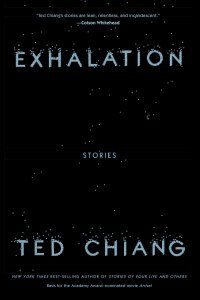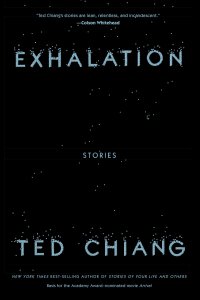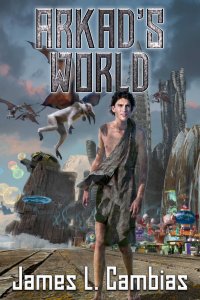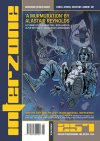Gary K. Wolfe Reviews Exhalation by Ted Chiang
 Exhalation, Ted Chiang (Knopf 978-1-101-94788-3, $25.95, 358pp, hc) May 2019.
Exhalation, Ted Chiang (Knopf 978-1-101-94788-3, $25.95, 358pp, hc) May 2019.
It’s not exactly as though Ted Chiang’s prolificacy is getting out of hand, but it might be worth noting that his long-awaited new collection Exhalation contains nine stories, while his previous collection Stories of Your Life contained only eight. On the other hand, that earlier collection covered the first 11 years of his career, while the new one covers some 14 years, including two stories original to the collection. Among these stories are three Hugo Award winners and one nominee, a Nebula Award winner and a nominee, two Locus Award winners and a nominee, and a BSFA Award winner. Five have appeared in various “year’s best” anthologies. I guess he’s got it under control.
Of course, awards aren’t really a useful way of measuring Chiang’s achievement, and the question of productivity isn’t especially relevant to appreciating how a particular story works, although you get the impression that Chiang isn’t the sort of writer eager to whip something up for the latest dragons-and-kittens anthology. The only story here written to a prompt is a fairly minor steampunk piece, “Dacey’s Patent Automatic Nanny”, for Ann & Jeff VanderMeer’s The Thackery T. Lambshead Cabinet of Curiosities, although another, “What’s Expected of Us”, is one of those short Nature pieces meant to focus on a particular future or technology, with not too much room for character or plot. Nevertheless, the story efficiently encapsulates one of Chiang’s characteristic techniques, and one of his recurring philosophical concerns. The technique is to explore the (often unanticipated) consequences of a single new technology – in this case the “Predictor,” a device whose only function is to flash a green light one second before you press the button for the light. It becomes a worldwide sensation, but can lead to a kind of zombie-like state of immobility once the user realizes that it’s essentially a scientific refutation of the idea of free will. (I don’t really buy this sort of eureka-moment catastrophism, but then I never bought the old Campbell/Asimov canard that seeing the night sky for the first time would drive a whole civilization mad).
That theme of free will has fascinated Chiang since “Story of Your Life”. The most impressive new story here, “Anxiety is the Dizziness of Freedom” (a title that sounds like an existentialist rejoinder to Chiang’s earlier “Hell is the Absence of God”), features that single new technology, a device called a Prism which can enable the exchange of information between multiple timelines. This at first seems a boon to historians and even meteorologists, but it gives rise to new industry of “data brokers” who sell information about what an individual’s other lives might have been like, leading, among other things, to a Facebook-style social media envy that your other versions (or paraselves) might be doing better than you are. That isn’t the main theme of the story, but it’s an example of the kind of fractal plotting that enables Chiang to toss off suggestive ideas that might easily be stories unto themselves; for example, one of his main characters, Nat, works for a chain of Prism shops called SelfTalk, which is failing, Blockbuster-style, as cheaper Prisms make it possible for more and more people to visit alternate selves from home. Another subplot involves Nat’s coworker Morrow figuring out a way to use the Prisms to set up a scam involving what amounts to financial elder abuse, while yet another involves keeping in touch with an alternate timeline lover after the “original” has died in a car accident. Another main character, Dana, is a therapist haunted by guilt that she may have ruined a friend’s life through a betrayal way back in high school, until she learns what happened in alternate versions of that friend’s life. Throughout, Chiang’s focus is on the kinds of moral algebra that people concoct to rationalize their sometimes violent behavior (if alternate versions of me didn’t do it, it’s not so bad), and on the central idea that core personalities remain pretty constant over different timelines: you can’t escape who you are by appealing to different versions of yourself. The story resonates with another included here, “The Truth of Fact, the Truth of Feeling”, which juxtaposes a narrative involving the Tiv of West Africa – where the introduction by missionaries of written records created a conflict with oral tradition – and a near-future technology which enables people to maintain a virtually complete digital account of their entire lives. The lesson here is that we may not be reliable witnesses even of our own most meaningful experiences.
Those sorts of moral/logical conundrums fascinate Chiang and he’s willing to construct whole alternate cosmologies to explore them. The other original story, “Omphalos”, recalls the kind of fundamentalist universe made real that we saw in “Hell is the Absence of God”. It’s set in a world that was created by God only a few thousand years ago: tree segments or clamshells show growth rings going back only so far, revealing a smooth core that represents the moment of special creation. But the nascent science of astronomy reveals a puzzling anomaly that creates a spiritual crisis for the narrator, one that doesn’t really challenge the creation story, but that calls into question the special status of humanity. Sometimes Chiang’s characters can read like illustrations of ideas or moral exempla (he’s not above a slight strain of didacticism), but the genuine agony expressed in this narrator’s voice seems real, even in a cosmology that we recognize as absurd.
Of the older stories, “The Great Silence” is a short and clever meditation on the Fermi paradox and why we keep ignoring parrots (okay, just read it), while a couple are Chiang classics. “The Merchant and the Alchemist’s Gate” uses the embedded-story technique of the Arabian Nights to explore possible consequences of time travel. The narrator visits an alchemist’s shop in medieval Baghdad where he is shown a device (described in terms that subtly suggest a wormhole) which can lead to the past by passing through it in one direction, or to the future by passing through the opposite way. The alchemist had built a full-scale gate in Cairo, and shares three tales of people who tried to use it with varying and cleverly intertwined results. The narrator is warned that the past cannot be changed – “what is made cannot be unmade” – which of course turns out to be a lesson he has to learn for himself, and this again returns us to that theme of free will. The title story, “Exhalation”, remains to my mind the most astonishing of Chiang’s stories, set in a bizarre world surrounded by chromium walls, in which the movements of argon gas animate mechanical beings. The narrator is one of these beings, who after a truly remarkable scene in which he disassembles and examines his own mind, comes to realize that entropy governs even a universe as disconnected from our own as this one.
“The Lifecycle of Software Objects”, which remains Chiang’s longest piece of fiction, is also one of his most conventional, in that it features an incipient romance between the two main characters, focuses on issues of childrearing and child development as they might apply to AIs, and explores how conventional capitalist decision-making could threaten the virtual platforms – the very universes – in which the AIs, here called “digients,” must survive. Playing out over a decade in the lives of a zookeeper hired to adapt her primate skills to training the newly minted digients, a dissatisfied corporate designer of the digients, and the digients that each of them “own,” it can be heartbreaking in its portrayal of evolving minds that are legally nothing more than products, and of the cruelty humans are willing to impose on them. Despite its characteristically cool and understated style, it’s among the most emotionally engaging of Chiang’s stories. It may be, in fact, that Chiang’s detached and self-effacing voices – a number of his stories are humbly addressed to specific audiences, like a caliph (“The Merchant and the Alchemist’s Gate”), the Lord (“Omphalos”), museum-goers (“Dacey’s Patent Automated Nanny”), or later explorers of a doomed world (“Exhalation”) – are keys to what his wildly disparate fictions have in common. At their best they have much the same kind of appeal of Borges’s most provocative tales – not without feeling and empathy, but, fundamentally, explorations of the sheer romance of thinking.
Gary K. Wolfe is Emeritus Professor of Humanities at Roosevelt University and a reviewer for Locus magazine since 1991. His reviews have been collected in Soundings (BSFA Award 2006; Hugo nominee), Bearings (Hugo nominee 2011), and Sightings (2011), and his Evaporating Genres: Essays on Fantastic Literature (Wesleyan) received the Locus Award in 2012. Earlier books include The Known and the Unknown: The Iconography of Science Fiction (Eaton Award, 1981), Harlan Ellison: The Edge of Forever (with Ellen Weil, 2002), and David Lindsay (1982). For the Library of America, he edited American Science Fiction: Nine Classic Novels of the 1950s in 2012, with a similar set for the 1960s forthcoming. He has received the Pilgrim Award from the Science Fiction Research Association, the Distinguished Scholarship Award from the International Association for the Fantastic in the Arts, and a Special World Fantasy Award for criticism. His 24-lecture series How Great Science Fiction Works appeared from The Great Courses in 2016. He has received six Hugo nominations, two for his reviews collections and four for The Coode Street Podcast, which he has co-hosted with Jonathan Strahan for more than 300 episodes. He lives in Chicago.
This review and more like it in the May 2019 issue of Locus.
 While you are here, please take a moment to support Locus with a one-time or recurring donation. We rely on reader donations to keep the magazine and site going, and would like to keep the site paywall free, but WE NEED YOUR FINANCIAL SUPPORT to continue quality coverage of the science fiction and fantasy field.
While you are here, please take a moment to support Locus with a one-time or recurring donation. We rely on reader donations to keep the magazine and site going, and would like to keep the site paywall free, but WE NEED YOUR FINANCIAL SUPPORT to continue quality coverage of the science fiction and fantasy field.








